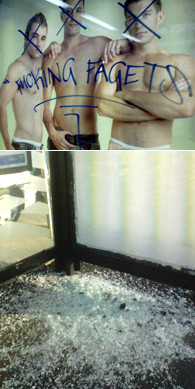Gay marriage show sparks TV row in Hong Kong
The Hong Kong Broadcasting Authority's move to label a Radio Television Hong Kong (RTHK) television programme on gay marriage as being unsuitable during family viewing hours has resulted in a public row so intense that it required a minister's intervention.

"RTHK has the role to speak out for minority groups. But the staff might feel pressure and avoid certain subjects in future. If we don't do it, other broadcasters might also avoid [it]. It will be a great loss to the public," said RTHK Programme Staff Union Chairwoman Mak Lai Ching on the ruling, voicing fears that colleagues might feel under pressure when producing future programmes.
The dispute prompted Secretary for Commerce, Industry and Technology Joseph Wong Wing-ping to intervene and ask to meet Director of Broadcasting Chu Pui-hing behind closed doors at government headquarters yesterday.
The authority felt the show was too accepting of same-sex marriages.
On Saturday, the Broadcasting Authority ruled that an episode of the RTHK-produced series Hong Kong Connection shown on TVB Jade on July 9 during peak family viewing hours was "unfair, partial and biased towards homosexuality, and having the effect of promoting the acceptance of homosexual marriage."
RTHK disputed the decision, saying the finding of an "unfair, partial and biased" presentation left room for further deliberation.
According to the Broadcasting Authority, 22 complaints were received alleging that "the programme was biased towards homosexuality, promoted homosexuality and contained discriminating elements," "unsuitable for broadcast at the scheduled time and exerted a bad influence on children and youths," "unfair to Christians as a whole as the reference to opposition from a Christian in the programme gave viewers a misleading impression that all Christians were irrational," "did not mention the undesirable aspects of homosexuality such as AIDS" and "did not contain a warning caption." However, watchdog group Television and Entertainment Licensing Authority (Tela) told the South China Morning Post those were "unsubstantiated."
The Post reported that the authority agreed that those complaints were unsubstantiated as "the reference to opposition from one individual Christian shown in the programme did not amount to a generalisation that all Christians were irrational," "the major cause of AIDS was unprotected sex rather than homosexual sex" and "a warning caption was provided at the beginning of the programme."
However, because the show had a positive opinion about making same-sex marriage legal, and about gay people in general, it violated the Hong Kong television code that said that programmes "dealing with matters of public policy or controversial issues of public importance in Hong Kong" should present impartial views.
RTHK Programme Staff Union Chairwoman Mak Lai Ching voiced fears over the ruling, saying colleagues might feel under pressure when producing future programmes.
"RTHK has the role to speak out for minority groups. But the staff might feel pressure and avoid certain subjects in future. If we don't do it, other broadcasters might also avoid [it]. It will be a great loss to the public," Mak said.
Since then, gay groups and civil rights activists as well as three interviewees from the programme have had a joint press conference.
The civil rights activist said that the authority's move has hindered civic education in Hong Kong, while interviewees from the programme accused the administration of stifling open debate on homosexuality.
Joseph Cho Man-kit, who appeared on the controversial programme, said the government's criticism of it was a "blatant act of discrimination against different sexual orientation."
"The whole point of the programme was to bring a controversial topic out into the public so the public can have a better understanding and learn to be more tolerant."
He said the gay community welcomed the programme, especially as those who had yet to "come out" hoped their families would be more accepting after watching it. "The government's decision is another example of the gradual regression in open debate on these issues."
The issue has been widely discussed on the blogosphere and a sampling can be viewed at www.globalvoicesonline.org.
Related web site:
Press Release for the Broadcasting Authority Meeting on 20 January 2007
Homophobic attack on safe sex bus shelter ad in Auckland
A bus shelter advertisement, which promotes a web site designed to encourage gay and bisexual men to play safe while hooking up, was defaced with anti-gay graffiti, then smashed. The advertisement was one in a series of nine limited placements designed to address the burgeoning number of HIV cases among gay and bisexual men in the inner city.

Photos courtesy of the New Zealand AIDS Foundation
"This is a reminder of the everyday prejudice that gay and bisexual men still have to endure twenty years after homosexual law reform," says Gay Men's Health Team Co-ordinator Douglas Jenkin in a media release. "HIV flourishes in environments of ignorance and hatred, and cowardly actions like these make our work that much more difficult."
Jenkin says police have been informed about the attack, which appears to be an isolated incident. "The campaign has been running since December, and we've received no complaints. With 45 per cent of New Zealand's gay and bisexual population living in Auckland, there's a lot of support when incidents like this occur. It's a lot harder for gay and bisexual men in more isolated communities."
Otherwise, feedback has been very positive on the campaign, which promotes condom use and HIV awareness for gay and bisexual men hooking up via the Internet. "This hasn't deterred us from public advertising in the future - the safe sex message is too important," Jenkin says. "Prejudice we can work on, but there's no cure for HIV."
Related web site:
Menseekingmen.co.nz











 Printable Version
Printable Version










Reader's Comments
During prime time the TV always shows men and women kissing and making love, have we ever complained that you were promoting straight sex? now throughout the whole year, only this 22-min programme was produced, all of a sudden RTHK is agitating for gay marriage?
And undesirable aspects of homosexuality is AIDS? Now you just officially put a sign of equality between them, how clever!
The best thing is that Chu actually accepted the criticism, so stupid! AGGGHH!!
IMO, it just provides a platform for the minorites to speak for themselves. The Authority's view is unfair.
I was deeply moved by that tv programme and wish that we could have something like that in Singapore and Malaysia. Unfortunately, there are even less laws over here to protect against discrimination of homosexuals and homosexuality. TV programmes to protect the basic human rights of gay people here are practically non-existent!
FYI, sexually, I'm as straight as they come, but I'm a faghag and proud to be one!
Please log in to use this feature.